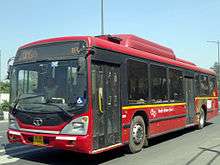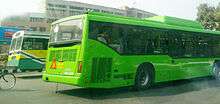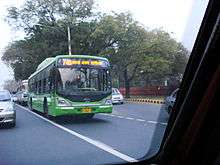Delhi Transport Corporation
| Public Sector Corporation under the Government of NCT of Delhi | |
| Industry | Public transport bus service |
| Founded | 1948 |
| Headquarters | Delhi, India |
Area served | Delhi |
| Products | Bus transport |
| Services | TATA AC Airbus, TATA non-AC Airbus, Local sight seeing, Inter-state bus service |
Number of employees | 18000 |
| Website |




Delhi Transport Corporation (DTC) is the main public transport operator of Delhi. It operates buses on many bus routes, including the mudrika (the Ring Road Service) and Bahri Mudrika (the Outer Ring Road Service). It is one of the largest CNG-powered bus service operator in the world.
History
The Delhi Transport Corporation was incorporated in May 1948 by the Indian government for local bus services when they found out the incumbent service provider Gwalior and Northern India Transport Company Ltd. was inadequate in serving the purpose. It was then named "Delhi Transport Service". It was again constituted as "Delhi Road Transport Authority" under the Road Transport Corporation Act, 1950. This Authority became an undertaking of Municipal Corporation of Delhi by an Act of Parliament in April, 1958.In 1971, on a recommendation from the Indian government took over the assets and liabilities from the erstwhile Delhi Transport Undertaking (DTU) operated by the Municipal Corporation of Delhi until 2 November 1971.Delhi Transport Corporation which was under administrative control of the Indian government was transferred to the Government of National Capital Territory, Delhi..
Routes
Delhi Transport Corporation operates on many routes in Delhi and neighbouring States. The mofussil buses operate around 46 depots out of which 18 depots are of old DTC buses and rest have low floor buses while the inter-state buses operate from the Three Inter State Bus Terminals in Kashmiri Gate, Sarai Kale Khan and Anand Vihar.
Intra-Delhi bus services
Delhi Transport Corporation services in Delhi has vastly distributed network of bus services. It connects almost every part of Delhi with this network of buses. The most Prominent of these being the Mudrika and the Bahri Mudrika Seva services interconnecting all parts of the city with a great frequency of buses until approximately 10:30 p.m.
Metro feeder buses
Transportation in Delhi is under-going a vast change with the entry of the Delhi Metro Rail Corporation. DTC has been helping Delhi Metro to connect Delhi City better by operating new bus routes connecting commuters in areas surrounding the metro stations for a better city experience.
High capacity bus service
Delhi Transport Corporation has started High Capacity Bus Service on a few routes and work is in progress to develop more high capacity bus routes. This service uses buses with improved carrying capacity and better facilities like air-conditioning, less travel time, less congestion, more comfortable interiors, GPS navigation etc.And now in the list of High Capacity Buses is the new, sleek, red coloured air-conditioned buses of the Delhi Transport Corporation, which was inaugurated by Chief Minister Sheila Dikshit on 4 June 2008 during the celebrations of World Environment Day in the Capital at India Gate. Chief Minister Sheila Dixit flagged off the eight new air-conditioned Red Line buses, which will initially ply on select routes in the capital, of which two will be on the newly constructed bus rapid transport corridor. The minimum bus fare starts at Rs.10 and the maximum is Rs.25.According to DTC officials, there will be 5,000 new low-floored buses in the capital, out of which, 1,000 will be air-conditioned.
Delhi Integrated Multi-Modal Transit System (DIMTS)
The buses that are being deployed under the cluster scheme would have state-of-the-art technology to guide and monitor them. They have been equipped with Global Position System (GPS) devices so that their movement and geographic location are tracked by the Automatic Vehicle Location System (AVLS) on real-time basis. Electronic Ticketing Machines (ETM) are being used on these buses in place of pre-printed tickets as part of the Automatic Fare Collection System (AFCS), which will include smartcard passes.Under the scheme the private concessionaires, who would be allotted clusters, would bring in their buses, arrange for their cleaning and maintenance and provide for the staff. For the services rendered, the concessionaire would be paid on the basis of an indexed cost system that would have a fixed component based on the cost of the bus, a variable component that would factor in the fuel and maintenance costs and a component that would deal with the wages cost keeping in mind the consumer price index.
Inter-state bus services

DTC is one of the premier bus services of North India. It connects almost all the major centres of North India with its services. It connects Uttar Pradesh, Punjab, Jammu and Kashmir, Himachal Pradesh, Uttarakhand, Rajasthan and Haryana.